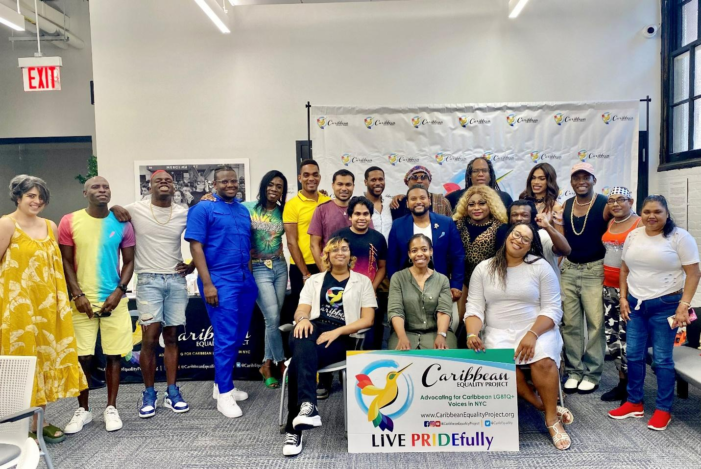Unchained members and CEP leadership with NYC Council Member Rita Joseph. Photo courtesy of Caribbean Equality Project.
Listen to a special podcast
By Xoë Sazzle and Mohamed Q. Amin
Since its inception in 2015, Caribbean Equality Project has remained steadfastly committed to its core values and mission of serving and advocating for Caribbean LGBTQ+ voices in NYC! This mission is perfectly exemplified by one of their flagship programs – Unchained.
Unchained, the first of its kind in New York City, is the Caribbean Equality Project’s peer-to-peer immigrant support group that anchors the organization’s Healing Justice work. The historic program creates an empowering space to affirm the unique cultural experiences and identities of Caribbean LGBTQ+ immigrants, those who are HIV-impacted, survivors of family rejection, discrimination, intimate partner violence, and sexual assault, to heal and build community in New York City.
New York City is home to the largest Caribbean diasporic population in the US, many of whom reside in Little Guyana in Richmond Hill, Queens, and Little Caribbean in Brooklyn. These Caribbean-centric neighborhoods are also home to a growing LGBTQ+ community, who often experience street harassment, homophobia, transphobia, cultural hate speech, and physical violence. As noted, Unchained was created out of necessity for a culturally competent healing space for Caribbean LGBTQ+ immigrants and those experiencing isolation and family rejection. For over eight years, the Unchained: Caribbean LGBTQ+ support group has reimagined safe spaces, specifically for Caribbean LGBTQ immigrants, through community building, education, empowerment, and peer-to-peer socializing. The group members comprise of asylum seekers from Guyana, Jamaica, and Trinidad and Tobago, Haiti, to name a few countries, who can safely explore their identities while receiving the much-needed services they require to thrive in New York City. These services include one-on-one counseling, housing, healthcare referrals, legal immigration services, affirming ID documentation resources, food security, and more.
Since its formation, Unchained has also been rooted in an educational component, navigated through discussions around building healthy relationships, gender identity, HIV care, mental health, intimate partner violence, and sexual assault in our communities. The topics are also centered on LGBTQ+ history and knowledge pertaining to social and racial justice movements. Many community members who attend embody these intersectional identities but may need to become more familiar with the activism-based terminologies and broader community histories that affect their day-to-day life experiences, especially in NYC.
When the COVID-19 pandemic struck, and the need to transform the program into the virtual sphere was imminent, questions about whether it would work or serve as a viable replacement arose, especially in the long term. Over time, CEP saw that this opened up a new kind of Unchained experience as the virtual meeting became more accessible to people who might not have been able to attend in person. There were new attendees from all over the Caribbean, Canada, and the United States who, otherwise, would have never been able to access the in-person program in NYC.
For the past three years, amid the evolving COVID-19 pandemic, Caribbean Equality Project’s Unchained groups created a virtual space to connect locally, nationally, and globally with the Caribbean rainbow family during this era of physical distancing and spaciousness, self-isolation, and staying home to stop the spread of the coronavirus. Their two experienced group facilitators —CEP’s Trans Justice Unit Organizer, Sai Ali, and Mental Health Outreach Specialist, Diahann Browne — have been holding in-person and virtual spaces for participants to release anxiety, combat loneliness, gain tools for managing stress, and be resilient. Initially, in response to the pandemic, the sessions were centered on health literacy – a vital platform to share the latest, most accurate information, encourage flattening the curve, and provide access to health resources. After that, the sessions took more of a mental health focus — especially coinciding with the murder of George Floyd, Breonna Taylor, and Tony McDade, a 38-year-old transgender man — who was shot and killed by a police officer in Tallahassee, Florida, in 2020. These catastrophic incidents within colliding pandemics opened up further opportunities within the Black Lives Matter movement to educate and influence impactful conversations and calls-to-action (focused on the history of police brutality, while grappling with the meaning of these acts of violence for people of African descent – specifically Afro-Caribbean, Queer and Trans people in America today). One of the most notable achievements of Unchained during this time was facilitating a virtual community vaccine information session with Dr. Julian Watkins of the NYC Department of Health and Mental Hygiene.
When reflecting on the program, Sai (she/her), who facilitates the Queens Unchained, expressed that she never imagined a program like Unchained would thrive in Richmond Hill. She yearned for a community space where the intersections of all her identities – trans, Indo-Caribbean, lesbian – would not find her in the minority. Being born to and raised by Indo-Guyanese parents, this was such a gift to find a community with LGBTQ+ people, who also shared her culture and indentured history. “I was at a point in my life’s journey where it was either transition or die, and when you live like that [in survival mode], it’s hard to imagine a future. So to find a place where I can imagine a future for myself as a facilitator and leader, and bring all my identities with me is truly something special,” said Sai. Based on her facilitator experience, Sai has recently decided to pursue a Bachelor’s degree in Social Work at Hunter College.
The second member of the facilitating pair, Brooklyn Unchained facilitator Diahann Browne (she/her), commented that this program helped her connect with her Caribbean culture and ethnicity. Diahann, a Black trans woman with Antiguan and African-American parents, never fully felt “Caribbean” compared to her contemporaries (who are Caribbean immigrants or who were born to Caribbean parents). It wasn’t until CEP came along, and created spaces teeming with cultural identities and practices, that allowed Diahann to get more in touch with her Caribbean roots, culture, and heritage. Diahann expressed that she was someone else living up to a name given to her when she first started her work with CEP, and her connection to the organization and Caribbean community allowed her to fully accept her womanhood. It nurtured her belonging and fostered acceptance of the fullness of her trans identity. Diahann remarks, “I’m so grateful to Unchained for coming into my life at that time and in the way it did.”
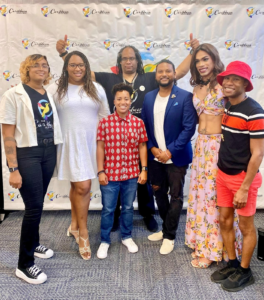
Unchained members and CEP leadership with NYC Council Member Crystal Hudson. Photo courtesy of Caribbean Equality Project.
In 2022, Caribbean Equality Project hosted a community brunch to celebrate the 7th Anniversary of Unchained. The event launched the in-person Brooklyn iteration of the program, a partnership with the Brooklyn Community Pride Center in Little Caribbean, NYC. The brunch-style community event featured inspirational testimonials from Unchained members, cultural performances, and delicious Caribbean food! New York Council Members Rita Joseph and Crystal Hudson attended the event.
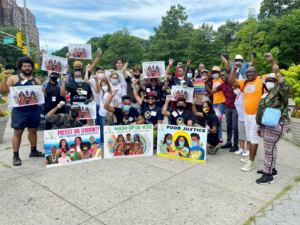
Monthly Food Distribution in Flatbush, Brooklyn. Photo courtesy of Caribbean Equality Project.
In planning this event, the CEP team wanted members from the Unchained groups, who were regular attendees, to share how the program impacted their lives as asylum seekers and undocumented immigrants and their own intersectional identities. Three community members were highlighted – Isabella Fernandes (she/her), Olivia Valwaa (she/her), and Erobos Lamashtu (he/him)- boldly sharing their stories of resilience and survival, avidly empowered by the Unchained program. Lamashtu and Valwaa echoed how the program facilitated opportunities to join the organization’s Community Action Team, a network of core volunteers who supported the Caribbean Equality Project’s 3-year running Food Justice program in Richmond Hill, Queens, Flatbush, Brooklyn, and Soundview in The Bronx.
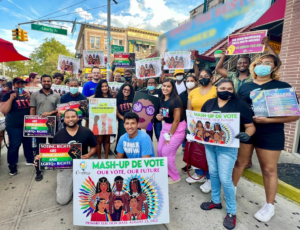
Little Guyana Votes Rally in Richmond Hill, Queens. Photo courtesy of Caribbean Equality Project.
Fernandes poignantly recalls the sadness she felt leaving Guyana, but underscores how the Unchained group became her new “home.” Leveraging her 15+ years of organizing experience from Guyana with the trans advocacy group, Guyana Trans United, she became an integral member of CEP’s Community Action Team, exhibiting immeasurable talent. Isabella expressed gratitude for the connections she has gained to much-needed immigration services, experiencing her first Pride celebration in NYC, and becoming civically activated through “Mash-Up De Vote,” the organization’s culturally-responsive non-partisan voter education political power-building campaign. In 2022, she conducted street outreach to register eligible Caribbean immigrant voters and made hundreds of COVID-19 and MPOX (formerly “monkeypox”) vaccine appointments. Fernandes joined Mohamed Q. Amin in Albany to advocate for the Lorena Borjas Transgender Wellness and Equity Fund, which aims to build equity for the transgender community in New York State. The legislation was passed and signed into law by Governor Kathy Hochul, establishing the historic fund in support of organizations like Caribbean Equality Project and others that provide life-saving services for the transgender, gender non-conforming, and non-binary communities
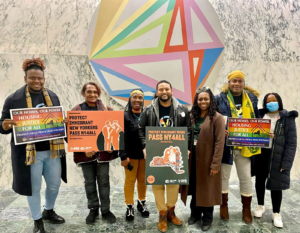
Members of Unchained and the Community Action Team in Albany, NY, January 2023. Photo courtesy of Caribbean Equality Project.
On December 29, 2022, the US Supreme Court ruled that Title 42, a pandemic-era public health emergency order used to expel asylum-seeking migrants from the US, will remain in effect. This ruling impacts Unchained members, who fear deportation- many of whom fled persecution, discrimination, and hate violence in the Caribbean. In 2023, Caribbean Equality Project will continue to demand that the Biden administration appeal the decision to reaffirm its commitment to protecting LGBTQ+, Black, Indigenous, and other vulnerable asylum-seekers. As a member of the New York Immigration Coalition, the organization’s 2023 legislative priorities includes the New York for All Act, which broadly prohibits state and local officers from enforcing federal immigration laws, funneling people into U.S. Immigration and Customs Enforcement (ICE) custody, and sharing sensitive information with ICE. Through Unchained, members are educated on how to advocate for their rights and how to join the fight for a humane approach to immigration reform.
The Queens Unchained group meets on the second Monday of every month, and the Brooklyn Unchained iteration meets on the last Monday of every month. To learn more about the Caribbean Equality Project work and its programming, visit https://www.caribbeanequalityproject.org, or connect with CEP on Facebook, Instagram, and YouTube at @CaribbeanEqualityProject and Twitter at @CaribEquality.

